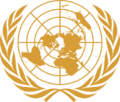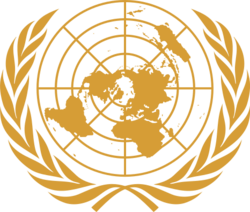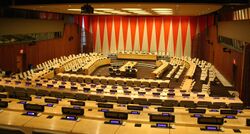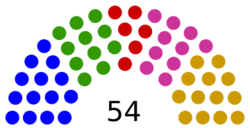Organization:United Nations Economic and Social Council
 | |
 | |
 United Nations Economic and Social Council chamber at United Nations headquarters` | |
| Type | Principal organ of the United Nations |
|---|---|
| Legal status | Active |
| Headquarters | New York City , United States; Geneva, Switzerland |
| Website | un.org/ecosoc |

African States (14) Asia-Pacific States (11) Eastern European States (6) Latin American and Caribbean States (10) Western European and Other States (13) | |
The United Nations Economic and Social Council (ECOSOC; French: Conseil économique et social des Nations unies, CESNU) is one of the six principal organs of the United Nations , responsible for coordinating the economic and social fields of the organization, specifically in regards to the fifteen specialised agencies, the eight functional commissions, and the five regional commissions under its jurisdiction.
ECOSOC serves as the central forum for discussing international economic and social issues, and formulating policy recommendations addressed to member states and the United Nations System.[1] It has 54 members.[2] In addition to a rotating membership of 54 UN member states, over 1,600 nongovernmental organizations have consultative status with the Council to participate in the work of the United Nations.[3]
ECOSOC holds one four-week session each year in July, and since 1998 has also held an annual meeting in April with finance ministers of heading key committees of the World Bank and the International Monetary Fund (IMF). Additionally, the High-Level Political Forum (HLPF), which reviews the implementation of the 2030 Agenda for Sustainable Development, is convened under the auspices of the Council every July.[4]
President
The president of the Council is elected for a one-year term and chosen from the small or medium sized states represented on the Council at the beginning of each new session.[5] The presidency rotates among the United Nations Regional Groups to ensure equal representation.[6]
Paula Narváez, Representative of Chile, was elected as the seventy-ninth president of the Council on 27 July 2023. She succeeded Lachezara Stoeva, who was elected as the seventy-eighth president of the Council on 25 July 2022,[7] succeeding Collen Vixen Kelapile of Botswana.[8]
Members
The Council consists of 54 Member States, which are elected yearly by the General Assembly for overlapping three-year terms. Seats on the Council are allocated ensuring equitable geographic rotation among the United Nations regional groups, with 14 being allocated to the African Group, 11 to the Asia-Pacific Group, 6 to the Eastern European Group, 10 to the Latin American and Caribbean Group and 13 to the Western European and Others Group.[9][10]
Current members
| Term | African States | Asia-Pacific States | Eastern European States |
Latin American & Caribbean States |
Western European & Other States |
|---|---|---|---|---|---|
| 2024 – 2026[11][12] | Template:Country data white Vacant[note 1] |
||||
| 2023 – 2025 | |||||
| 2022 – 2024[13] | Error creating thumbnail: Unable to save thumbnail to destination Belize |
Observer Inter-Governmental Autonomous Organisations
Participation on a continuing basis:[14]
Participation on an ad hoc basis:[14]
Commissions
Functional commissions
Active
The following are the active functional commission of the Council:[15][16]
- Commission on Narcotic Drugs (CND)
- Commission on Population and Development (CPD)
- Commission on Science and Technology for Development (CSTD)
- Commission on the Status of Women (CSW)
- Statistical Commission
- Commission for Social Development (CSocD)
- Commission on Crime Prevention and Criminal Justice (CCPCJ)
- Forum on Forests (UNFF)
Disbanded
The following commissions were disbanded by the Council and replaced by other bodies:
- Commission on Human Rights (UNCHR)
- Commission on Sustainable Development (CSD)
Regional commissions
The following are the active regional commissions of the Council:[16]
- United Nations Economic Commission for Europe (ECE)
- United Nations Economic Commission for Africa (ECA)
- United Nations Economic Commission for Latin America and the Caribbean (ECLAC)
- United Nations Economic and Social Commission for Asia and the Pacific (ESCAP)
- United Nations Economic and Social Commission for Western Asia (ESCWA)
Committees and other bodies
The following are some of the other bodies that the Council oversees in some capacity:[16]
Standing committees
- Committee for Programme and Coordination (CPC)
- Committee on Non-Governmental Organizations
- Committee on Negotiations with Intergovernmental Agencies
Expert bodies
- Committee for Development Policy (CDP)
- Committee on Economic, Social and Cultural Rights (CESCR)
- Committee of Experts on Global Geospatial Information Management (UN-GGIM)
- Committee of Experts on International Cooperation in Tax Matters
- Committee of Experts on Public Administration (CEPA)
- Committee of Experts on the Transport of Dangerous Goods and the Globally Harmonized System of Classification and Labelling of Chemicals
- Group of Experts on Geographical Names (UNGEGN)
- Intergovernmental Working Group of Experts on International Standards of Accounting and Reporting
- Permanent Forum on Indigenous Issues (UNPFII)
Other subsidiary bodies
- System Chief Executives Board for Coordination (CEB)
- High-Level Committee on Management (HLCM)
- High-Level Committee on Programmes (HLCP)
Specialized agencies
The specialized agencies of the United Nations are autonomous organizations working within the United Nations System, meaning that while they report their activities to the Economic and Social Council, they are mostly free to their own devices. Each agency must negotiate with the Council as to what their relationship will look and work like. This leads to a system where different organizations maintain different types of relationships with the Council.[21][22] Some were created before the United Nations existed and were integrated into the system, others were created by the League of Nations and were integrated by its successor, while others were created by the United Nations itself to meet emerging needs.[23]
The following is a list of the specialized agencies reporting to the Council:[24]
- Food and Agriculture Organization (FAO)
- International Civil Aviation Organization (ICAO)
- International Fund for Agricultural Development (IFAD)
- International Labour Organization (ILO)
- International Monetary Fund (IMF)
- International Maritime Organization (IMO)
- International Telecommunication Union (ITU)
- United Nations Educational, Scientific and Cultural Organization (UNESCO)
- United Nations Industrial Development Organization (UNIDO)
- United Nations World Tourism Organization (UNWTO)
- Universal Postal Union (UPU)
- World Bank Group (WBG)
- World Health Organization (WHO)
- World Intellectual Property Organization (WIPO)
- World Meteorological Organization (WMO)
"World Economic and Social Survey 2011: The Great Green Technological Transformation"
In a report issued in early July 2011, the UN called for spending nearly US$2 trillion on green technologies to prevent what it termed "a major planetary catastrophe", warning that "It is rapidly expanding energy use, mainly driven by fossil fuels, that explains why humanity is on the verge of breaching planetary sustainability boundaries through global warming, biodiversity loss, and disturbance of the nitrogen-cycle balance and other measures of the sustainability of the earth's ecosystem".[25]
UN Secretary-General Ban Ki-moon added: "Rather than viewing growth and sustainability as competing goals on a collision course, we must see them as complementary and mutually supportive imperatives". The report concluded that "Business as usual is not an option".[26]
Reform of the Economic and Social Council
The governance of the multilateral system has historically been complex and fragmented. This has limited the capacity of ECOSOC to influence international policies in trade, finance, and investment. Reform proposals aim to enhance the relevance and contribution of the council. A major reform was approved by the 2005 World Summit based on proposals submitted by secretary-general Kofi Annan.[27] The Summit aimed to establish ECOSOC as a quality platform for high-level engagement among member states and with international financial institutions, the private sector, and civil society on global trends, policies, and action. It resolved to hold biennial high-level Development Cooperation Forums at the national-leadership level, transforming the high-level segment of the Council to review trends in international development cooperation and promote greater coherence in development activities. At the Summit it was also decided to hold annual ministerial-level substantive reviews to assess progress in achieving internationally agreed on development goals (particularly the Millennium Development Goals). These "Annual Ministerial Reviews" will be replaced by the High-Level Political Forum from 2016 onwards after the new post-MDG/post-2015 Sustainable Development Goals are agreed upon.[28]
Subsequent proposals by the High-Level Panel Report on System-Wide Coherence in November 2006 aimed to establish a forum within the ECOSOC as a counter-model to the exclusive clubs of the G8 and G20. The Forum was to comprise 27 heads of state (L27, corresponding to half of ECOSOC's membership) to meet annually and provide international leadership in the development area. This proposal, however, was not approved by the General Assembly.[29]
Chamber design
The Economic and Social Council Chamber in the United Nations Conference Building was a gift from Sweden. It was conceived by Swedish architect Sven Markelius, one of the 11 architects in the international team that designed the UN headquarters. Wood from Swedish pine trees was used in the delegates' area for the railings and doors.[30]
The pipes and ducts in the ceiling above the public gallery were deliberately left exposed; the architect believed that anything useful could be left uncovered. The "unfinished" ceiling is a symbolic reminder that the economic and social work of the United Nations is never finished; there will always be something more that can be done to improve living conditions for the world's people.[31]
See also
- List of organizations with consultative status to the United Nations Economic and Social Council
- Copenhagen Consensus
- French Economic and Social Council
- European Economic and Social Committee (EU)
- Hard Choices: Moral Dilemmas in Humanitarian Intervention
- International Court of Justice
- International Hydrological Programme
- UN Secretariat
- UN Security Council
- UN Trusteeship Council
- UN Department of Economic and Social Affairs
- Union of International Associations
- Science, technology, engineering, and mathematics
- Chapter X of the United Nations Charter
- G20
References
- ↑ "About ECOSOC". ECOSOC. https://www.un.org/en/ecosoc/about/index.shtml.
- ↑ "High-Level Political Forum 2020 (HLPF 2020)". https://sustainabledevelopment.un.org/hlpf/2020#vnrs.
- ↑ Basu, Rumki (2019). The United Nations. Sterling. p. 83. ISBN 978-81-207-2775-5. https://www.google.com/books/edition/The_United_Nations_Structure_Functions_O/IjWMX9nCa0sC?hl=en&gbpv=1&pg=PA83.
- ↑ "Welcome to csonet.org | Website of the UN DESA NGO Branch. At your service". https://csonet.org/?menu=123.
- ↑ Mu Xuequan (27 July 2018). "UN ECOSOC Elects New President". Xinhua News Agency. http://www.xinhuanet.com/english/2018-07/27/c_137350465.htm.
- ↑ "United Nations Official Document, Rule 20.2". https://www.un.org/ga/search/view_doc.asp?symbol=E/5715/Rev.2.
- ↑ "ECOSOC President 2022 Her Excellency Lachezara Stoeva". https://www.un.org/ecosoc/en/2022-He-lachezara-stoeva.
- ↑ "President of ECOSOC". n.d.. https://www.un.org/ecosoc/en/president-ecosoc.
- ↑ "Members". https://www.un.org/ecosoc/en/content/members.
- ↑ "General Assembly Elects 19 Economic and Social Council Members to Terms Beginning 1 January 2020, Adopts Resolution Commemorating Signing of United Nations Charter". United Nations. 14 June 2019. https://www.un.org/press/en/2019/ga12153.doc.htm.
- ↑ "ECOSOC Membership by Year". Dag Hammarskjöld Library. https://research.un.org/en/unmembers/ecosocmembers.
- ↑ "Türkiye elected to UN Economic and Social Council". Anadolu Agency. 8 June 2023. https://www.aa.com.tr/en/turkiye/turkiye-elected-to-un-economic-and-social-council-/2917951.
- ↑ "Announcement of 22 new members for 2022 term". https://twitter.com/UNECOSOC/status/1402300886463004672.
- ↑ 14.0 14.1 ECOSOC observers, Part V
- ↑ "Subsidiary Bodies of ECOSOC". United Nations. n.d.. https://www.un.org/ecosoc/en/content/subsidiary-bodies-ecosoc.
- ↑ 16.0 16.1 16.2 Manhire, Vanessa, ed (2019). "United Nations Handbook 2019–20". United Nations Handbook: An Annual Guide for Those Working with and within the United Nations (Wellington: Ministry of Foreign Affairs and Trade of New Zealand): 144–198. ISSN 0110-1951. https://www.mfat.govt.nz/en/peace-rights-and-security/work-with-the-un-and-other-partners/un-handbook-2019-20.
- ↑ "UN Creates New Human Rights Body". BBC (London). 15 March 2006. http://news.bbc.co.uk/2/hi/europe/4810538.stm.
- ↑ "United Nations Human Rights Council (HRC)". Union of International Associations. n.d.. https://uia.org/s/or/en/1100052982.
- ↑ "United Nations Commission on Sustainable Development (CSD)". Union of International Associations. n.d.. https://uia.org/s/or/en/1100043826.
- ↑ Template:UN doc
- ↑ Cohn, Theodore H. (2016-05-05) (in en). Global Political Economy: Theory and Practice. Routledge. ISBN 9781317334828. https://books.google.com/books?id=DNweDAAAQBAJ&q=These+specialised+agencies+are+autonomous+organisations+working+with+the+United+Nations+and+each+other+inter+alia+through+the+coordinating+machinery+of+the+Economic+and+Social+Council.&pg=PA24.
- ↑ "UN Specialized Agencies". The Levin Institute. http://www.globalization101.org/un-specialized-agencies/.
- ↑ Kurtas, Susan. "Research Guides: UN System Documentation: Specialized Agencies" (in en). https://research.un.org/en/docs/unsystem/sa.
- ↑ "Funds, Programmes, Specialized Agencies and Others". United Nations. n.d.. http://www.un.org/en/sections/about-un/funds-programmes-specialized-agencies-and-others/.
- ↑ "World Economic and Social Survey 2011 | Department of Economic and Social Affairs". https://www.un.org/development/desa/dpad/publication/world-economic-and-social-survey-4/.
- ↑ "The World Economic and Social Survey 2011: The Great Green Technological Transformation'". Thaindian News. http://www.thaindian.com/newsportal/tech-news/un-calls-for-technological-revolution-or-major-planetary-catastrophe_100547662.html.
- ↑ Ian Williams, "Annan has paid his dues". The Guardian, 19 September 2005
- ↑ UNDESA (8 July 2015). "Session 18: Reviewing and monitoring progress: What have we learned and how can it advance implementation?". https://sustainabledevelopment.un.org/index.php?page=view&type=400&nr=1801&menu=35.
- ↑ "Turkmenistan Elected to ECOSOC for 2019-2021". 15 June 2018. http://gca.satrapia.com/+turkmenistan-elected-to-ecosoc-for-2019-2021+.
- ↑ Anand, Ankit. "Project Work of Political Science". Chanakya National Law University. https://www.scribd.com/document/219915387/Project-Work-of-Political-Science.
- ↑ UN website.
Further reading
- Mathews-Schultz, A. (2020). "The Untold History of the United Nations, the US State Department, and Organized Interests in the Postwar Era." Social Science History, 44(2), 197–222.
External links
- Official website – United Nations Economic and Social Council
- United Nations Department of Economic and Social Affairs
- Congo – Conference of UN NGO's
- Global Policy Forum – Social and Economic Policy at the UN (archived 5 September 2006)
- United Nations
- The Group of Eight, ECOSOC and the Constitutional Paradox (in French)
 |

